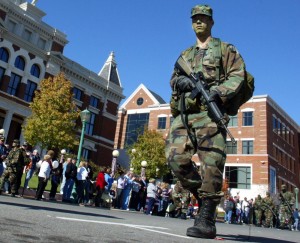–ccoppedge@my.apsu.edu
APSU is the only four-year university in the state of Tennessee to be named a “Best For Vets College” by the Military Times.
According to the Military Times website, over 650 schools (a new record) completed the Best For Vets College survey of almost 150 questions. Only 68 schools were qualified for the list. The number one four-year college for military veterans, according to the survey, was Eastern Kentucky University in Richmond, KY. APSU ranked 43.
One of APSU’s draws for student veterans are its various military accommodations. There are out-of-state fee waivers for active duty military, early registration for veterans, veteran-specific sections of classes, and the ability to withdraw without penalty if they are deployed or activated.
Various organizations serve the student veterans on APSU’s campus. The Military Student Center inside the Morgan University Center lets student veterans, active duty military, ROTC students and family members study, relax and interact with other students. Inside the center are a lounge area, a study table and computers and printers available for use.
Additionally, the center helps veterans and military students transition into college life while educating students about the sacrifices and challenges that student veterans go through with workshops and outreach events throughout the year.
Also, the Student Veterans Organization, which began as a discussion group for student veterans, was officially formalized in April 2010.
It is associated with the Student Veterans of America, which is a network of college and university student veteran groups throughout the United States.
The Military Times took several factors into account when compiling the list of veteran-friendly colleges.
The factors include the full and part-time enrollment of student veterans for the university in question.
They also considered whether the Veterans Affairs Department participates in the Yellow Ribbon program, where the school and VA contribute equal amounts to fully or partially make up the difference between a school’s tuition and the post-9/11 GI Bill’s nationwide cap for funding.
Other factors include whether or not a school has a central office for handling veteran issues, the number of staff members who spend time helping veterans and their issues, the level of academic support given by the university, and graduation rates.
One key factor is whether or not the school participates in the federal Veterans Upward Bound program.
This determines the basic academic skills of student veterans, and then works to improve those skills through mentoring, academic instruction, counseling, and tutoring when necessary.


